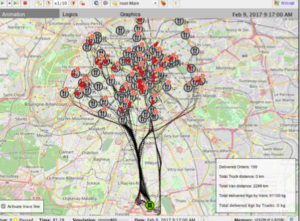Regulatory policies aim at reducing the negative effects of urban freight transportation, especially those related to traffic, emissions and noise. Nonetheless, stakeholders in city logistics often have divergent objectives, which lead to difficulties upon defining the best possible choices regarding regulation. A new paper on HoReCa deliveries in Paris by MINES ParisTech presents a multi-agent and discrete-event based simulation of urban deliveries that aims at evaluating the impacts of regulatory policies.
Restrictions regarding vehicle weights and time windows are evaluated in order to measure the impacts on deliveries based on total distances, number of vehicles, loading rates and air pollutant emissions. The simulation framework is applied to the delivery services for restaurants, in which four scenarios of regulation were evaluated in the city of Paris.
One originality of the proposed approach is to use real data for the instantiation of agents and the GIS in the simulation. The notion of changing the delivery time-windows in order to reduce the number of vehicles in an urban zone has proven to be erroneous. Another notion is the use of light commercial vehicles creating more flexibility to cope with time-windows.
You can find more information about this study by clicking here.

